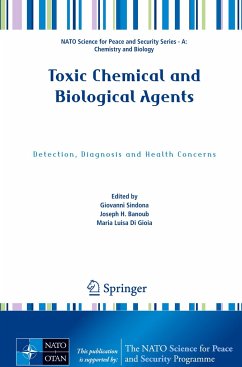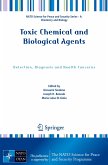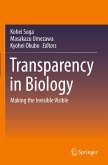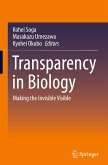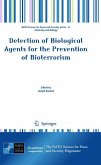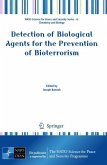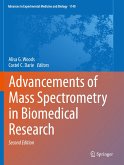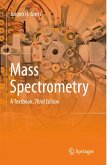Toxic Chemical and Biological Agents
Detection, Diagnosis and Health Concerns
Herausgegeben:Sindona, Giovanni; Banoub, Joseph H.; Di Gioia, Maria Luisa
Toxic Chemical and Biological Agents
Detection, Diagnosis and Health Concerns
Herausgegeben:Sindona, Giovanni; Banoub, Joseph H.; Di Gioia, Maria Luisa
- Gebundenes Buch
- Merkliste
- Auf die Merkliste
- Bewerten Bewerten
- Teilen
- Produkt teilen
- Produkterinnerung
- Produkterinnerung
This book critically assesses the current state of knowledge on new and important detection technologies, e.g. mass spectrometry, tandem mass spectrometry, biosensor detection and tissue imaging, in connection with toxic chemical and biological agents.
In general, the main topics discussed concern the risks and consequences of chemical and biological agents for human health in general, with special emphasis on all biochemical and metabolic pathways including the reproductive system. The exposome, genetic risks and the environment, various health hazard agents, risk assessment, environmental…mehr
Andere Kunden interessierten sich auch für
![Toxic Chemical and Biological Agents Toxic Chemical and Biological Agents]() Toxic Chemical and Biological Agents154,99 €
Toxic Chemical and Biological Agents154,99 €![Transparency in Biology Transparency in Biology]() Transparency in Biology108,99 €
Transparency in Biology108,99 €![Transparency in Biology Transparency in Biology]() Transparency in Biology108,99 €
Transparency in Biology108,99 €![Detection of Biological Agents for the Prevention of Bioterrorism Detection of Biological Agents for the Prevention of Bioterrorism]() Detection of Biological Agents for the Prevention of Bioterrorism154,99 €
Detection of Biological Agents for the Prevention of Bioterrorism154,99 €![Detection of Biological Agents for the Prevention of Bioterrorism Detection of Biological Agents for the Prevention of Bioterrorism]() Detection of Biological Agents for the Prevention of Bioterrorism161,99 €
Detection of Biological Agents for the Prevention of Bioterrorism161,99 €![Advancements of Mass Spectrometry in Biomedical Research Advancements of Mass Spectrometry in Biomedical Research]() Advancements of Mass Spectrometry in Biomedical Research93,99 €
Advancements of Mass Spectrometry in Biomedical Research93,99 €![Mass Spectrometry Mass Spectrometry]() Jürgen H. GrossMass Spectrometry67,99 €
Jürgen H. GrossMass Spectrometry67,99 €-
-
-
This book critically assesses the current state of knowledge on new and important detection technologies, e.g. mass spectrometry, tandem mass spectrometry, biosensor detection and tissue imaging, in connection with toxic chemical and biological agents.
In general, the main topics discussed concern the risks and consequences of chemical and biological agents for human health in general, with special emphasis on all biochemical and metabolic pathways including the reproductive system. The exposome, genetic risks and the environment, various health hazard agents, risk assessment, environmental assessment and preparedness, and analysis of sub-lethal effects at the molecular level are also discussed. In closing, the book provides comprehensive information on the diagnosis of exposure, and on health concerns related to toxic chemical and biological agents.
In general, the main topics discussed concern the risks and consequences of chemical and biological agents for human health in general, with special emphasis on all biochemical and metabolic pathways including the reproductive system. The exposome, genetic risks and the environment, various health hazard agents, risk assessment, environmental assessment and preparedness, and analysis of sub-lethal effects at the molecular level are also discussed. In closing, the book provides comprehensive information on the diagnosis of exposure, and on health concerns related to toxic chemical and biological agents.
Produktdetails
- Produktdetails
- NATO Science for Peace and Security Series A: Chemistry and Biology
- Verlag: Springer / Springer Netherlands / Springer, Berlin
- Artikelnr. des Verlages: 978-94-024-2040-1
- 1st edition 2020
- Seitenzahl: 296
- Erscheinungstermin: 20. Oktober 2020
- Englisch
- Abmessung: 241mm x 160mm x 22mm
- Gewicht: 558g
- ISBN-13: 9789402420401
- ISBN-10: 9402420401
- Artikelnr.: 59433781
- Herstellerkennzeichnung Die Herstellerinformationen sind derzeit nicht verfügbar.
- NATO Science for Peace and Security Series A: Chemistry and Biology
- Verlag: Springer / Springer Netherlands / Springer, Berlin
- Artikelnr. des Verlages: 978-94-024-2040-1
- 1st edition 2020
- Seitenzahl: 296
- Erscheinungstermin: 20. Oktober 2020
- Englisch
- Abmessung: 241mm x 160mm x 22mm
- Gewicht: 558g
- ISBN-13: 9789402420401
- ISBN-10: 9402420401
- Artikelnr.: 59433781
- Herstellerkennzeichnung Die Herstellerinformationen sind derzeit nicht verfügbar.
Professor Giovanni Sindona from the Department of Chemistry, University of Calabria (Italy) died on Thursday January 16, 2020. We have lost a dear friend, a scholar and a gentleman. Giovanni was born in Messina, Italy in 9 April 1949 and graduated with a B.Sc. (Hons) Chemistry in 1972 at the University of Messina. After completing his PhD in applied to bioanalytical chemistry (mass spectrometry). In 1978, he was awarded he "Alexander von Humboldt foundation Fellowship" from the renowned Institute für Physikalische Chemie of Bonn University. At the beginning of the 80s, was as NATO scholar at the King's college of London under the direction of Professor Colin B. Reese where he developed new strategies for the synthesis of nucleic acids. In 1990, he became full professor of organic chemistry at the university of Calabria teaching organic chemistry also at the University of Magna Graecia Catanzaro. In his academic career, he held important management offices: He was Deanof the Mathematics, Physics, and Natural Sciences faculty from 1994 to 1997. He directed the department of Chemistry from 1997 to 2003 and from 2007 to 2015 during the establishment of the former Department of Chemistry and Chemical Technologies From 1990 to 2019, Prof Sindona has organized and directed five NATO International Schools for young researchers on the application of mass spectrometry to biomolecular chemistry held in Italy and abroad. In 2009, he became co-director of many NATO-ASI, Science for Peace and Security Program for experts on the Detection of Biological Agents and Toxins for the Prevention of Bioterrorism in Homeland Security. Professor Sindona has been member of the Italian Society of Chemistry (SCI), where he was president of the Mass Spectrometry Division and coordinator of the inter divisional group of proteomic; he was president of the SCI Calabria section, and from 1979 he was permanent member of the German foundation "Alexander von-Humboldt"; Professor Sindona was member of the American Society of Mass Spectrometry from 1990. He was awarded of the "Piria Award for research"in 2008, and in 2011 he received the international award "Il Bergamotto" for his studies on the research activity linked to Calabria region. Dr. Banoub is currently Head and Principal Senior Scientist, Special Projects Section at Fisheries and Ocean Canada (DFO), St. John's. He also holds two joint appointments as adjunct professor in Chemistry and Biochemistry Departments, Memorial University of Newfoundland. He has an active independent research program for over 40 years; during which, he supervised 34 graduate students and contributed to over 200 peer-reviewed publications. He currently serves as Editor PLOS ONE and Vaccines journals. He is a member of the Editorial Boards of Rapid Communication in Mass Spectrometry, Journal of Chromatography B, Journal of Chromatography A, Food Chemistry, Journal of Analytical Sciences, and Methods and Instrumentations. Dr. Banoub has a rich leadership experience. He served as a Manager of the Environmental Sciences Division (1997-2002) in DFO. He was also frequently appointed to senior executive positions in the Canadian government such as the International Science Strategy Committee which aimed at improving, funding science projects and developing national and international policies for various government departments and industry. Dr. Banoub was the recipient of the "Dr. Albert R. Cox Research Award" (2002) from the Faculty of Medicine, Memorial University outstanding research on the isolation and structural identification of triterpine glycosides from quillaja saponoria molina and investigation of their adjuvant properties in a herpes simplex vaccine model. He has also received Fred P. Lossing Award for Distinguished contributions to mass spectrometry in Canada, 2012 and the Sir Winfield Templeman Award for Best Research in 2016for his work on Lignomics Analysis. Maria Luisa Di Gioia (Ph.D., Calabria University) is a Researcher of Organic Chemistry at the Department of Pharmacy, Health and Nutritional Sciences of the University of Calabria. She holds the Italian qualification to Associate Professor in Organic Chemistry. Her research interests include the synthesis and characterization of molecules with potential biological activity. Peptides are an important part of her work.
1.Professor Giovanni Sindona.- 2.Evaluation of Quality and Safety of Foods by Tandem Mass Spectrometry.- 3.Detection of Biological Warfare Agents Using Biosensors.- 4.Mass Spectrometry Methods for Food Safety/Detection of Toxins in Food.- 5.Fundamentals of Mass Spectrometry-Based Metabolomics.- 6.Direct Mass Spectrometry as a Practical Analytical Strategy for High Speed, High Throughput Testing.- 7.Mass Spectrometry in Ecotoxicology.- 8.Matrix-assisted laser desorption/ionization imaging mass spectrometry: technology and applications.- 9. Risks and Consequences of Hazard Agents to Human Health.- 10.Bacterial threats to human health and food supply.- 11.An overview of male reproductive toxicants: facts and opinions.- 12.Defense Against Biological Terrorism: Vaccines and their Characterization.- 13.Environmental Impact of Air Pollution on Human Health in the Annaba region (Algeria).- 14.New insight into Idiopathic Nephrotic Syndrome: Strategy based on Urinary Exosomes.- 15.Synthesis oflong-chain esters under continuous flow conditions.- 16. Data Independent Acquisition Mass Spectrometry for Proteomic Advances into Isolated Methylmalonic Acidemia.- Deposition strategies of nano-TiO2 photocatalyst for wastewater applications.- 18.Tri-modal MALDI-MS imaging on the same tissue section: Deeper molecular insights of disease.- Fabrication of QDs dimers with sub-nanometer interparticle distance.- Mapping Molecular Interactions in the Clostridium difficile Infected Gastrointestinal Tract Using Multimodal Imaging Mass Spectrometry.- Detection, Identification and Monitoring of Chemical Warfare Agents a comparison between on-field and in-lab approach.- New tools for rapid and sensitive detection of water contamination: whole-cell biosensors and cell-free TX-TL systems.- A Novel Origami Paper-Based Chemiluminescent Biosensor Integrated With A Smartphone Device for Organophosphorus Compounds Detection.- Solid-phase microextraction combined with microwave-assisted extraction using eco-friendly solvents as a new approach for the analysis of toxic compounds from environmental solid matrices.- Recent advances in MALDI mass spectrometry imaging: a cutting-edge tool for the diagnosis of thyroid nodules.- 26.Luminescent Polymeric Nanovectors loaded with Darunavir for treatment of HIV-Associated Neurological Diseases.- Investigation of the N-Glycoproteome in the Urinary Exosomes: Technical Challenges by Technical Challenges.- Fluoroquinolones In Water: Removal Attempts By Innovative AOPs.- Evaluation of Surface Second Harmonic Generation SSHG for Detection of Antibody-Antigen Interactions.- Impact of asbestos-related toxicity on Italian working population: preliminary incidence data from the last 5 years across the whole country.- Magnetically Targeted Delivery of Sorafenib through Magnetic Solid Lipid Nanoparticles towards Treatment of Hepatocellular Carcinoma.- Identification of Some Organic Solvents During Regular Forensic Determination of Alcohols in Bloodand Bioliquids.
1.Professor Giovanni Sindona.- 2.Evaluation of Quality and Safety of Foods by Tandem Mass Spectrometry.- 3.Detection of Biological Warfare Agents Using Biosensors.- 4.Mass Spectrometry Methods for Food Safety/Detection of Toxins in Food.- 5.Fundamentals of Mass Spectrometry-Based Metabolomics.- 6.Direct Mass Spectrometry as a Practical Analytical Strategy for High Speed, High Throughput Testing.- 7.Mass Spectrometry in Ecotoxicology.- 8.Matrix-assisted laser desorption/ionization imaging mass spectrometry: technology and applications.- 9. Risks and Consequences of Hazard Agents to Human Health.- 10.Bacterial threats to human health and food supply.- 11.An overview of male reproductive toxicants: facts and opinions.- 12.Defense Against Biological Terrorism: Vaccines and their Characterization.- 13.Environmental Impact of Air Pollution on Human Health in the Annaba region (Algeria).- 14.New insight into Idiopathic Nephrotic Syndrome: Strategy based on Urinary Exosomes.- 15.Synthesis oflong-chain esters under continuous flow conditions.- 16. Data Independent Acquisition Mass Spectrometry for Proteomic Advances into Isolated Methylmalonic Acidemia.- Deposition strategies of nano-TiO2 photocatalyst for wastewater applications.- 18.Tri-modal MALDI-MS imaging on the same tissue section: Deeper molecular insights of disease.- Fabrication of QDs dimers with sub-nanometer interparticle distance.- Mapping Molecular Interactions in the Clostridium difficile Infected Gastrointestinal Tract Using Multimodal Imaging Mass Spectrometry.- Detection, Identification and Monitoring of Chemical Warfare Agents a comparison between on-field and in-lab approach.- New tools for rapid and sensitive detection of water contamination: whole-cell biosensors and cell-free TX-TL systems.- A Novel Origami Paper-Based Chemiluminescent Biosensor Integrated With A Smartphone Device for Organophosphorus Compounds Detection.- Solid-phase microextraction combined with microwave-assisted extraction using eco-friendly solvents as a new approach for the analysis of toxic compounds from environmental solid matrices.- Recent advances in MALDI mass spectrometry imaging: a cutting-edge tool for the diagnosis of thyroid nodules.- 26.Luminescent Polymeric Nanovectors loaded with Darunavir for treatment of HIV-Associated Neurological Diseases.- Investigation of the N-Glycoproteome in the Urinary Exosomes: Technical Challenges by Technical Challenges.- Fluoroquinolones In Water: Removal Attempts By Innovative AOPs.- Evaluation of Surface Second Harmonic Generation SSHG for Detection of Antibody-Antigen Interactions.- Impact of asbestos-related toxicity on Italian working population: preliminary incidence data from the last 5 years across the whole country.- Magnetically Targeted Delivery of Sorafenib through Magnetic Solid Lipid Nanoparticles towards Treatment of Hepatocellular Carcinoma.- Identification of Some Organic Solvents During Regular Forensic Determination of Alcohols in Bloodand Bioliquids.

